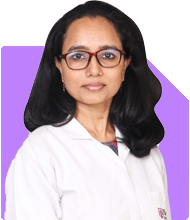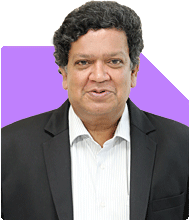77-Year-Old Post-Bypass Patient Seeks Advice for Weakness, Dizziness, and Muscle Pain
Dr Hemalata Arora | Answer |Ask -Follow
General Physician - Answered on Jun 21, 2024
In a career spanning over 24 years, she has focused on managing infectious diseases, critical illnesses and lifestyle disorders.
Dr Arora completed her MBBS and MD from the King Edward Memorial Hospital and Seth Gordhandas Sunderdas Medical College in Mumbai.
She is ECFMG certified, accredited by the American Board of Internal Medicine, Diplomate of the National Board and a DNB faculty.
She was honoured with the Paul Bunn award for her promising performance in the field of infectious diseases at SUNY Upstate Medical University, New York.... more

I am 77 years old. I was taking medicine for high BP from the age of 50 years.I was very active doing yoga regularly in the morning and doing walk in the evening. I do not smoke and do not drink as well. I am a person with height weight normal as per the standard chart. I was very active doing my job and never use to get tired. I worked for six years in Central Govt, thirty years in PSU and seventeen years in Private Organisations. I used to believe that " a Person should never retire from work". I stopped going to work from March 2020 after the Covid 19 spread in India. During a routine check up, my doctor mentioned on my prescription as "Stable Angina". I asked about it but he replied, it is nothing, do not worry. I was not having any pain etc. But this remark of Stable Angina. was written on my prescription on every visit. In June 2022, I got a CT Angiography done just to know the deposits in my arteries. It was found to be more in all the five arteries. But I had no symptoms of any pain or breathlessness while moving or working.In August 2022, I got some problem in my left eye, went to eye specialist, he observed a little deposit in eye nerve. He tried to break it but could not. I went for Angiography. All the arteries were found with deposits but still I had no pain etc. I was operated for Heart By pass Surgery on 22.9.22 and released from Hospital on 1.10.22. I was put on High Protein Diet. During Jan 23 to July 23, my Blood Urea Nitrogen & Urea got up the required level.High Protein Diet was stopped and advised take more Fruits. BUN & Urea came normal. More fruits were being taken. It caused potassium level to go up. Then in fruits also restriction imposed on banana, coconut water & citrus fruits. Now I am on restricted diet. BUN & Urea are normal but potassium remains fluctuating. Now I am alright but feel very weak. I do little walk but get tired soon. I am not able to do yoga due to low energy. Vitamin supplements are being taken but not getting strength. Even feels stability problem. While standing feels giddiness and feels that i may fall. I am also feeling severe pain in my arms muscles. Now I am taking medicines for BP, Cholesterol, Blood Thinner, Enlarged Prostrate Gland, Vitamin supplement. I always think why I am feeling so many problems after Heart Bye Pass Surgery. Please advise.
You may like to see similar questions and answers below
Dr Ashit Hegde | Answer |Ask -Follow
Consultant Physician, Internal Medicine and Critical Care Expert - Answered on May 30, 2023
Dr Hemalata Arora | Answer |Ask -Follow
General Physician - Answered on Jun 07, 2023
Ramalingam Kalirajan |10893 Answers |Ask -Follow
Mutual Funds, Financial Planning Expert - Answered on Dec 15, 2025
Ramalingam Kalirajan |10893 Answers |Ask -Follow
Mutual Funds, Financial Planning Expert - Answered on Dec 15, 2025
Radheshyam Zanwar |6746 Answers |Ask -Follow
MHT-CET, IIT-JEE, NEET-UG Expert - Answered on Dec 15, 2025
Ramalingam Kalirajan |10893 Answers |Ask -Follow
Mutual Funds, Financial Planning Expert - Answered on Dec 15, 2025
Ramalingam Kalirajan |10893 Answers |Ask -Follow
Mutual Funds, Financial Planning Expert - Answered on Dec 15, 2025
Ramalingam Kalirajan |10893 Answers |Ask -Follow
Mutual Funds, Financial Planning Expert - Answered on Dec 15, 2025
Samraat Jadhav |2508 Answers |Ask -Follow
Stock Market Expert - Answered on Dec 15, 2025
Ramalingam Kalirajan |10893 Answers |Ask -Follow
Mutual Funds, Financial Planning Expert - Answered on Dec 15, 2025
Reetika Sharma |425 Answers |Ask -Follow
Financial Planner, MF and Insurance Expert - Answered on Dec 15, 2025
Radheshyam Zanwar |6746 Answers |Ask -Follow
MHT-CET, IIT-JEE, NEET-UG Expert - Answered on Dec 15, 2025

























